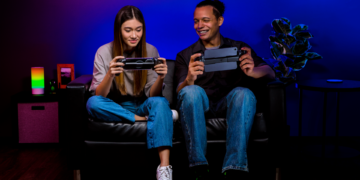Gaming is like oxygen in our house—essential and ever-present. Our daughter already has a Nintendo Switch, which she has a pretty healthy relationship with, so the idea of introducing a PlayStation wasn’t about opening a gaming Pandora’s box. When a family member offered her a refurbished PS4 for her upcoming 10th birthday, I thought, “Why not?” My partner, however, vetoed the idea faster than a speedrunner skipping a cutscene. Thus began The Great PS4 Debate of 2024.
The question that sparked a debate
What’s the “right” age for a child to get their first (or, in our case, next) gaming console? A straightforward question on the surface, but it spiralled into compromises, passionate opinions, and, bizarrely, a random pharmacy cashier weighing in. After this stranger chimed in to agree with my perspective, my partner actually reconsidered—proof that this topic is as subjective as it gets.
My stance? Gaming is incredible when done with boundaries. My partner? Still sceptical.
What do other parents think?
I took the debate to the wilds of the internet and was met with a glorious mix of answers:
- “When they can actually play it.” No one wants a toddler accidentally formatting the console.
- “I got mine at 5!” Overachiever alert.
- “10 seems reasonable.” Team reasonable for the win!
- “Not until 40.” Extreme, but okay.
- “Follow the age ratings on games.” Sensible advice.
- “Just not Fortnite.” Shots fired.
The consensus? It depends on the child, their maturity, and how the family approaches gaming.
Gaming in a neurodivergent household
As an AuDHD parent, I see gaming as both an opportunity and a potential minefield. For neurodivergent kids, consoles can foster creativity, problem-solving, and even sensory regulation. But without limits, they’re dopamine dispensers that can lead to hyperfixation.
Here’s how we plan to approach it:
- Choose Games Wisely: Non-violent, age-appropriate options like Astro Bot, The Lego Series, Sack Boy, Alba, Stardew Valley or educational games are great for starters.
- Set Boundaries: Weekend-only gaming, time limits, and no online play keep things manageable.
- Use Parental Controls: PS4 settings make it easy to block unsuitable content and limit screen time.
- Be Involved: Co-op play isn’t just bonding. It’s a way to monitor habits.
- Balance Is Key: Gaming is part of life, not the whole thing. Outdoor play, creative hobbies, and social time keep things in perspective.
When is the right time?
Gaming has come a long way since our pixelated Pacman days. It’s culture, connection, and creativity rolled into one. But introducing kids—especially neurodivergent ones—to gaming requires thought and boundaries.
Ultimately, the “right” age depends on the child, the family’s values, and a willingness to adapt. With a Switch already in the mix, the question for us is more about expanding horizons than introducing something brand new. As we gear up for our daughter’s birthday, we’re cautiously optimistic about finding a middle ground.
What do you think? Is 10 the right age, or should we wait? Share your take over at @UnrulyFolk on Threads.



























































